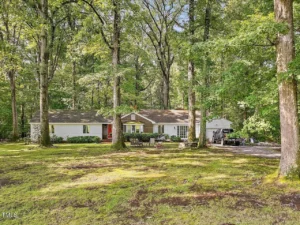Eric Andrews is a Real Estate Broker, Investor’s Buyer’s Agent and Property Manager. Greg Stafford is a real estate investor. Both work in Pittsboro and Chatham County.
Below you will find a gold mine of information about purchasing investment property and property management.
There are 10 sections below with 10 videos. All 10 videos are together in a Playlist here for your convenience.
Investigating Income Property
Expect the unexpected when it comes to investment property.
When buying a home in North Carolina, buyers are provided with a Due Diligence period. During this period, there are many things which buyers can discover which may make them think twice about buying a property to live in or rent out.
Common problems include sellers who lie and listing agents who are not as forthcoming with the facts as they should be.
A good buyer’s agent and inspection service may help you discover problems which could affect the property’s income potential.
There are things the investor can do that the buyer’s agent can’t do as well, such as speaking to neighbors.
Goals for Income Properties
Everyone has different goals when it comes to income properties.
Many investors have specific goals such as having a home pay for itself in a 10 year time period. In Pittsboro North Carolina and elsewhere in Chatham and Wake County, some investors may factor in both the rental income and the property’s appreciation and valuation as property values continue to increase.
Are Infomercials and DVDs on Real Estate Investing a Scam?
Every DVD and infomercial we’ve seen claiming people can “get rich quick” by buying income properties or flipping houses has been a terrible waste of time. Many of these seminars are very misleading.
We should point out here that most people offering to sell you something telling you how to get rich quick are looking for ways to make money themselves. If they were making money by flipping houses and renting homes, they would be spending their time doing that, not sharing their information with you.
Even the “good” advice is generally worthless when it comes to buying homes in North Carolina as these people simply do not know your market. Markets are drastically different from County to County.
To make money investing in real estate takes time and money. It will take 10yrs to get a return, and you aren’t going to buy a home for “zero money down”, especially in Chatham County.
Building relationships with general contractors, electricians, plumbers and HVAC repair companies is key to making money.
Other DVDs recommend people try to buy distressed properties via assumptions. This is something else which simply doesn’t happen in Chatham County. Sitting at the courthouse and putting up signs saying you purchase distressed properties simply doesn’t happen.
Reputation and Keeping Your Word with Buying Investment Properties
In the accompanying video, Eric Andrews explains the importance of keeping your word when buying property, good or bad.
As with many parts of life, making promises and keeping your word always wins in the long run.
Sellers and local real estate agents know if you have a poor reputation and will not take offers seriously if you’re a bad buyer.
Greg Stafford also lays out an example of a benefit of keeping your word: one of the homes he recently purchased for his real estate portfolio was in a bit of a bidding war. A broker told the seller’s agent that Greg has a great reputation and does what he says he does and he has made an offer, it is a solid offer. In this case, Greg’s offer was a lower offer but ultimately his bid was given priority and he was awarded the property solely due to his reputation.
How Should Landlords Treat Investment Properties?
Slumlords buy slummy properties, and slummy properties get slummy tenants.
Landlords who take care of their properties have great tenants, less vacancies and experience less damage to their homes.
Is Real Estate Investing a Long Term Investment? How Fast Can I Make Money?
Real estate investing is a long term investment. In markets like Chatham County, there is no “flipping properties” as all the good deals simply never make it to market.
Chatham County is growing rapidly and is expected to do so for the next several decades. Rental units appreciate in value and produce income while you own them. The way to make money in real estate is to buy properties which you can hold at least 10 years.
When buying a property, expect problems, purchasing a new roof, a new HVAC and to make many more repairs which usually cost $25,000 – $35,000.
Real Estate Investing – The Numbers
Investment Property Manager Eric Andrews and Real Estate investor Greg Stafford explain making the numbers work with investment properties.
Landlords should consider things like:
- How fast a home takes to get onto the market
- Discounts for renting homes – should you take less?
- Time of year. There are times f the year where people don’t want to move such as Thanksgiving or Christmas.
Some things which generally do not help the rental value of a home include aesthetics that please you, acreage and the size of a yard.
Benefits of Being Local: Distance to Scale
Investment Property Manager Eric Andrews and Real Estate investor Greg Stafford explain How to Lose Money by Chasing Distant Out of State Investment Properties.
Being local to Chatham County or any county for that matter provides tremendous benefits. Investors who buy properties far away or out of state lose money left and right by not knowing who to contact for property needs.
Using a local property management company helps:
- Keep costs down
- Eviction processes
- Knowing the municipality
- Knowing the future of land
Know Your Pros: Assembling a Great Team of Contractors
Real estate investors and property managers need a good list of handymen, roofers, plumbers, electricians, attorneys and more vendors.
The accompanying video is excellent and explains in full detail:
Is the Property Too Good to Be True?
If a property comes on the market and the listing is “too good to be true”, it is.
Greg Stafford explains that of the last 30 of 30 properties he has purchased, 0 have been an exceptional deal. Of the one deal he encountered where he accepted the seller’s great asking price, the seller then backed out and complained.
Broker Eric Andrews explains that if he has listed a property, he has done the research and has listed the property very close to market value.





